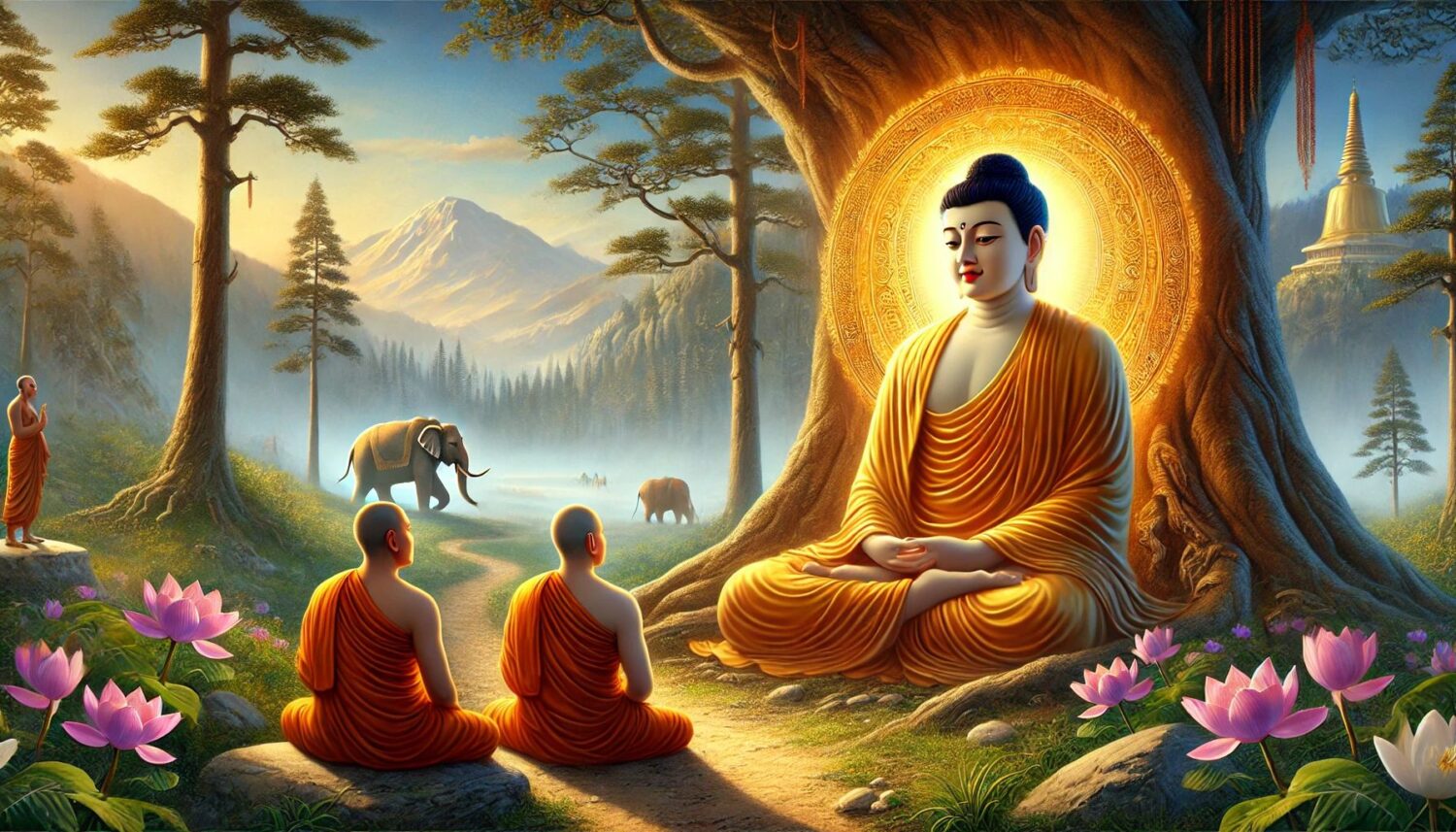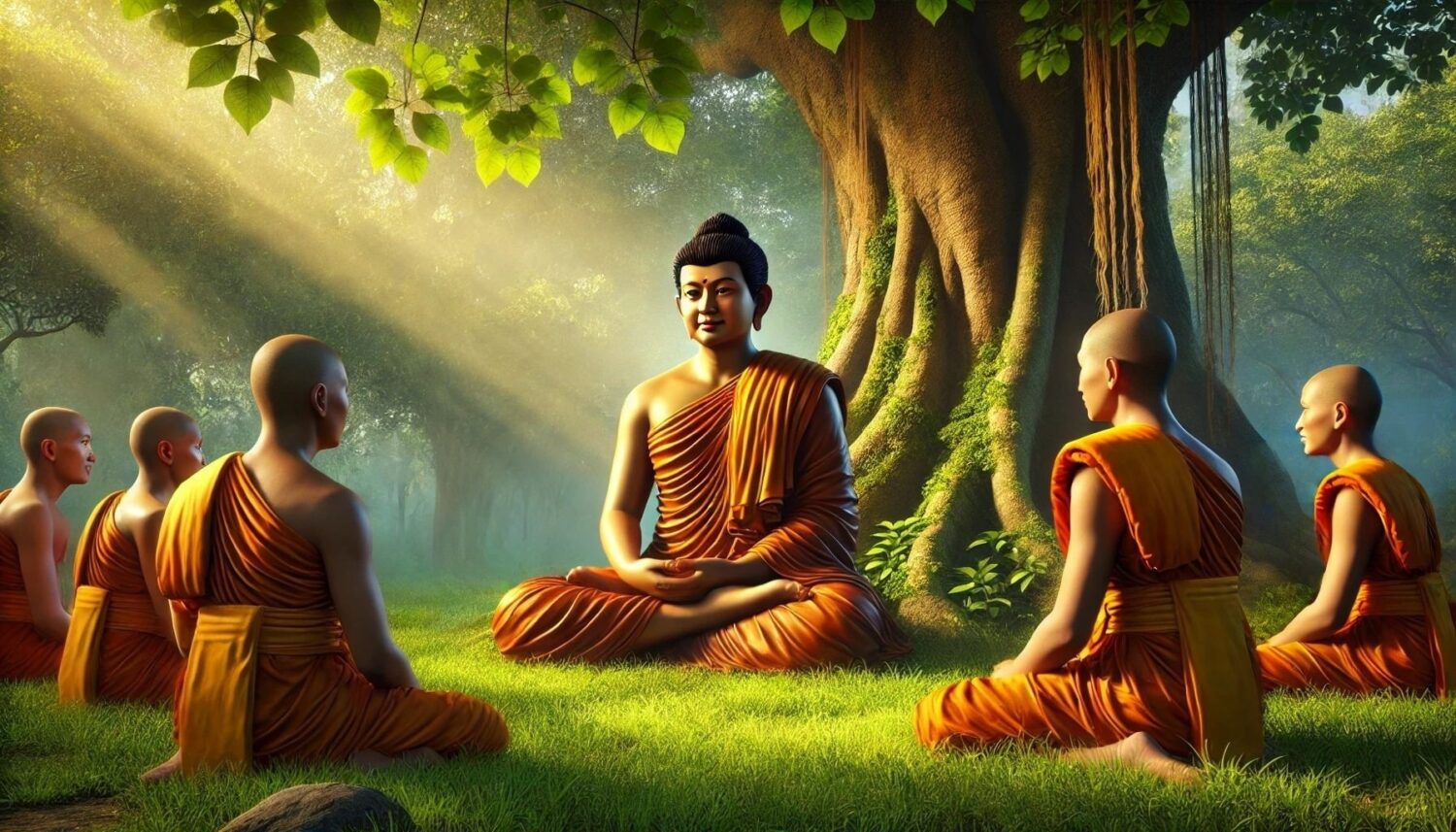
Date: 04/12/2025 04/13/2025
Location: Star Lake Meditation Center
Teacher: Shilin Long
Dharma Talk
The Story of Venerable Cūḷapanthaka
”If the mind is not steady and does not understand the true Dharma,
If one’s faith is not firm, wisdom will not be attained.”
”If one attains a mind free of defilements, free from all confusion,
Transcending both good and evil, the awakened one has no fear.”
(Verses 38 and 39 from the Chapter on the Mind)
This verse was spoken by the Buddha at Jetavana Monastery in Śrāvastī for Venerable Cūḷapanthaka, who had ordained seven times and returned to lay life six times before finally attaining Arhatship.
In Śrāvastī, there was a young cowherd who, after losing a cow, ran into the forest searching for it. By noon, he finally found the cow and drove it back to the herd. Feeling extremely thirsty and hungry, he entered a monastery in the forest. After paying respects to the monks, he sat down nearby. Seeing his hunger, the monks said to him, “There is some food left in the bucket, you may eat it.”
During the Buddha’s time, due to his great virtues and teachings, people often offered food and support to the Buddha and the monastic community. As a result, the monks frequently received abundant offerings of rice and curry dishes. Thus, the young cowherd was able to enjoy a full meal from the bucket. After eating, he expressed his gratitude to the monks and asked, “Venerable sirs, where are you going today for alms?”
The monks replied, “Nowhere, layman! It is the same as our usual alms.”
The young man thought, “I work tirelessly day and night, yet I can never earn such delicious and abundant food. What is the point of living a householder’s life? I should become a monk!”
So he expressed his wish to ordain and join the monastic community. The monks said, “Excellent! Layman, you are welcome to be part of the Sangha.”
At first, after ordaining, he was diligent in fulfilling his monastic duties and never neglected the tasks assigned to him. Moreover, due to the abundant offerings from the laypeople, he soon became plump and well-fed.
However, before long, he started to feel bored and thought, “Why should I live such a life of begging? I should return to lay life!” So he left the Sangha and went home.
After only a few days at home, lacking enough food, his body became thin again. He thought, “Why should I suffer hunger like this? I should ordain again!” So he returned to the monastic community.
But soon, he again lost interest in monastic life and returned home. After a few days at home, he once again felt unhappy and thought, “Why should I remain a householder? I should ordain again!” Thus, he repeatedly ordained and disrobed.
After leaving and returning six times, the monks started calling him “Venerable Cūḷapanthaka”, meaning “one who is fickle-minded, unable to control his thoughts, and constantly changing his mind.”
Because he repeatedly broke his vows and returned home, his wife eventually became pregnant.
One day, after returning home from work in the forest, he once again reflected on the benefits of monastic life. He entered his bedroom to take his robe, preparing to ordain for the seventh time.
As he stepped inside, he saw his wife sleeping on the bed. Her dirty clothes were scattered on the floor, her mouth was wide open like a frog, drooling, snoring loudly, and grinding her teeth. She looked just like a swollen corpse.
He was suddenly shocked: “Is this not the reality of impermanence and suffering? I have ordained so many times, but because of her, I have never been able to remain in the Sangha. How foolish I have been!”
So he picked up his robe, tied it around his waist, and decisively rushed out the door.
His mother-in-law, who lived next door, saw him hurrying out and wondered, “He just returned from the forest, yet now he is tying his robe and leaving again. What is going on?” She immediately ran over to her daughter’s room and, seeing her ugly sleeping posture, she vaguely understood what had happened. She shouted at her daughter:
”Wake up, you greedy, lazy woman! Your husband saw your hideous sleeping posture and has become disgusted. He has left for good and will never come back for you!”
Her daughter, still half-asleep, mumbled: “Mother, don’t worry! How long can he stay away? He will come back in a few days.”
As Venerable Cūḷapanthaka walked on the road, his wife’s sleeping image kept appearing in his mind. “How had her once beautiful form changed into such a state?” He kept reflecting on impermanence and suffering, and finally his wisdom awakened—he attained the first stage of enlightenment, Sotāpanna (Stream-entry).
When he returned to the monastic community, the monks said:
”We cannot accept you into the Sangha again. You have shaved your head so many times, yet you have never cut away the defilements of greed, anger, and ignorance in your heart. Your head has become like a whetstone only used for sharpening razors! How can you remain in the Sangha and truly renounce worldly desires?”
”Venerable sirs, please have compassion and accept me one more time!” he pleaded.
The monks, remembering his previous contributions to the community, reluctantly gave him one last chance.
A few days later, not only did he attain Arhatship, but he also fully mastered the Four Analytical Knowledges (Paṭisambhidā-ñāṇa).
Some monks, unaware of his transformation, occasionally joked with him:
”Why haven’t you disrobed yet? If you miss your wife, just go home!”
Venerable Cūḷapanthaka replied:
”When my mind still had attachments, I left. But now, I have cut off all attachments, and I will never leave again.”
The monks still doubted his words, so they asked the Buddha.
The World-Honored One said:
”Monks, it is true. You do not need to doubt. When his mind was unsteady and he did not understand the true Dharma, he was always indecisive, wavering between renunciation and worldly life. But now, he has transcended all dualities of good and evil, and he no longer has attachments or fears.”
Thus, the Buddha spoke the verse again:
”If the mind is not steady and does not understand the true Dharma,
If one’s faith is not firm, wisdom will not be attained.”
”If one attains a mind free of defilements, free from all confusion,
Transcending both good and evil, the awakened one has no fear.”
All those present rejoiced in the profound teachings of the Buddha.

